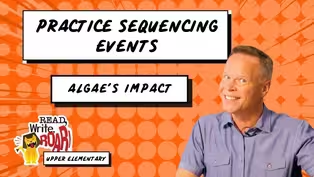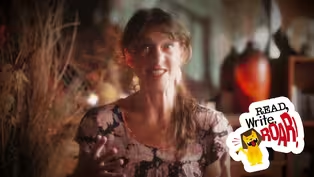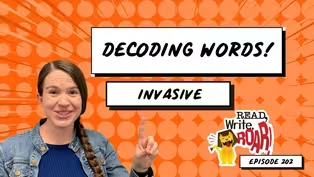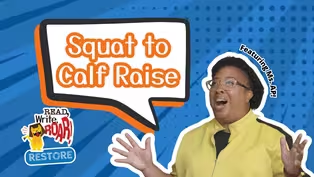Read, Write, ROAR!
Bring Shipwrecks to Life with Poetry | Jeff Kass | Read, Write, ROAR!
Clip: Season 1 Episode 1019 | 6m 25sVideo has Closed Captions
Bring a shipwreck’s story to life with poet and educator Jeff Kass.
Discover how to use research, imagination, and personification to bring a shipwreck’s story to life with poet and educator Jeff Kass.
Problems playing video? | Closed Captioning Feedback
Problems playing video? | Closed Captioning Feedback
Read, Write, ROAR! is a local public television program presented by Detroit PBS
Read, Write, ROAR!
Bring Shipwrecks to Life with Poetry | Jeff Kass | Read, Write, ROAR!
Clip: Season 1 Episode 1019 | 6m 25sVideo has Closed Captions
Discover how to use research, imagination, and personification to bring a shipwreck’s story to life with poet and educator Jeff Kass.
Problems playing video? | Closed Captioning Feedback
How to Watch Read, Write, ROAR!
Read, Write, ROAR! is available to stream on pbs.org and the free PBS App, available on iPhone, Apple TV, Android TV, Android smartphones, Amazon Fire TV, Amazon Fire Tablet, Roku, Samsung Smart TV, and Vizio.
Providing Support for PBS.org
Learn Moreabout PBS online sponsorship[Music] did you know there are thousands of sunken ships at the bottom of the Great Lakes and many shipwrecks haven't even been discovered yet i don't know about you but I'm fascinated by shipwrecks sometimes I wonder who was on the boat that went down into the watery depths did anybody survive what caused the wreck was there bad weather or just bad luck what was the boat carrying when it sank where was it headed every shipwreck has a story a story that's often lost when a boat lies at the bottom of a lake or ocean and year after year it slowly decays until someday is as though it was never even there but what if a shipwreck could talk what kind of story would it tell hi everyone I'm Jeff Cass and today we're going to talk about a kind of writing technique called personification personification is when you take an inanimate object or a thing that can't move or talk or think on its own and you use your imagination to give it human qualities you make it move or talk or think for example if I say "My living room couch looks very welcoming this afternoon like it really wants me to lie down on it and take a nap i'm giving the couch the human emotions of being welcoming and of having a desire for me to nap on it but my couch is really just a bunch of pieces of wood screwed together with some fabric and stuffing sewn on top of it it can't actually feel any certain way you can also use personification with ideas like freedom or weather events like a hurricane or wind or something else that occurs in nature like a tree or a mountain but for today let's just stick with objects specifically let's stick with shipwrecks let's imagine that a shipwreck that's been lying at the bottom of Lake Michigan for a long time can actually talk and wants to tell us all about its experiences like what it was doing on the water in the first place what it imagines its purpose was how it crashed and what it feels like to be down at the bottom of the lake just rotting away or waiting to be discovered we'll need to imagine what a shipwreck might be thinking or feeling but we don't have to just use our imagination we can do some research about shipwrecks in Lake Michigan and use our imagination based on what's known about them for instance I recently heard about a shipwreck in Michigan called the Henry Clay that name sounded familiar to me like I kind of remembered it from history class in high school a long time ago i was curious and did some more research about Henry Clay and found out he was a pretty important person in early American history that's why a boat was named after him using what I learned I wrote a poem personifying the Henry Clay shipwreck and telling what I imagine is its story the Henry Clay in baseball everybody knows three strikes means you're out but what if you were born before baseball i mean I was born in 1777 when the United States was still a baby less than a year old didn't even know how to crawl yet i grew up to be a senator from the great state of Kentucky and was the speaker of the house only the seventh one in history when I helped end the War of 1812 later I became our nation's ninth secretary of state i brought people together i made deals i was a big deal they called me the great compromiser i ran for president in 1824 i lost strike one i ran for president again in 1832 lost again strike two i ran a third time in 1844 same result strike three what do you call a three-time loser the great compromise that nobody wanted at least somebody named a boat after me at least somebody believed I could brave the frigid waves of Lake Michigan even during the cold month of December in the cold year of 1850 unfortunately my skill at getting people to compromise did not help when the towering swell overwhelmed my deck and leaks sprang in my hall maybe the compromise was that my crew survived that they were lucky when the Troy stopped by on his way from Chicago to Detroit to save them maybe that's the ultimate compromise they go home to their families lived aboard a different boat another journey and I stay here stuck in the cold lonely dark here are some pointers to help you begin your research start with a question think about what you want to know like what happened to the ship where was it found you may not find answers to all your questions and that's okay asking questions will help you focus on what's most important about the shipwreck story and guide you to interesting information use different sources use websites videos magazines ask your teacher or a librarian for suggestions for trusted sources take notes write down interesting facts that stand out to you no need to write everything just the important parts pay attention to descriptions notice words that paint a picture of the ship was the ship unusually large or small did it have any special features or decorations descriptions can help you imagine a ship and bring it to life in your poem now it's time for you to try visit a website about shipwrecks and pick one that interests you do some research and then write a poem in the voice of that shipwreck be a boat tell the story thank you for joining us if you want more fun ways to practice literacy skills don't forget to subscribe to the Michigan Learning channel and be sure to check the description below for links to activity guides resources and more [Music] [Applause]
Bloom Boom: Algae Impact | Sequencing for Grades 4-5
Video has Closed Captions
Clip: S1 Ep1019 | 6m 45s | Dive into the world of algae and explore how human actions cause harmful algal blooms. (6m 45s)
Create a Bug Soundscape | Ms. Audra | Read, Write, ROAR!
Video has Closed Captions
Clip: S1 Ep1019 | 2m 21s | Explore the sounds of crickets, cicadas, and other insects and mimic their movements. (2m 21s)
Decoding Words! INVASIVE | Prefixes, Suffixes, and Root Words for Multisyllabic Words
Video has Closed Captions
Clip: S1 Ep1019 | 4m 31s | Learn bow to use prefixes and suffixes to break big words down into understandable word parts. (4m 31s)
Read, Write, ROAR! Restore - Squat to Calf Raise
Video has Closed Captions
Clip: S1 Ep1019 | 2m 31s | Join Ms. AP in a quick 2-minute movement snack focused on jumping jacks to restore your energy. (2m 31s)
Providing Support for PBS.org
Learn Moreabout PBS online sponsorship

- Home and How To

Hit the road in a classic car for a tour through Great Britain with two antiques experts.












Support for PBS provided by:
Read, Write, ROAR! is a local public television program presented by Detroit PBS




